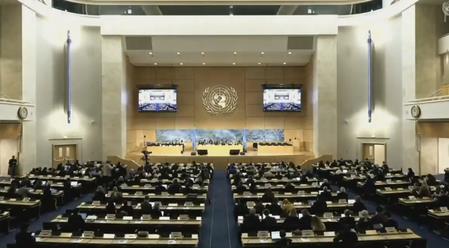UN Event Spotlights Persecution Of Religious Minorities In Pakistan And Bangladesh
The Global Human Rights Defence (GHRD), together with partners, hosted the event, which was attended by at least 50 members of civil society, missions, and permanent representations, including Greece, Denmark, China, India, and Bangladesh. It brought together human rights defenders and representatives of minority communities from across South Asia to shed light on systemic discrimination, violence, and exclusion.
“Protecting minority rights is not an act of charity. It is a question of justice, equality, and dignity - and central to building peaceful, inclusive, and resilient societies,” Charlotte Zehrer, Human Rights Officer at GHRD, said in her opening remarks.
Mehmmod ur Rehman Anwar, International Consultant on Human and Development Rights and Public Relations Officer for the Ahmadiyya Muslim Community in Switzerland, spoke on the atrocities against the Ahmadiyya community in Pakistan during the event
He detailed how Ahmadis are criminally targetted in Pakistan under discriminatory laws that deny them the right to identify as Muslims or freely practice their faith.“For Ahmadis, even basic religious expression can result in criminal charges,” he stated, urging the international community to take stronger action against Pakistan's blasphemy laws and institutionalized persecution.
Addressing the plight of the Sindhi community in Pakistan, Farhan Kaghzi, General Secretary of the World Sindhi Congress (WSC), highlighted the forced conversions of Sindhi Hindu women and girls, describing this as a growing crisis marked by coercion, violence, and impunity.
Kaghzi called on the Human Rights Council to recognise forced conversions as a gross violation of international human rights standards and to press for accountability and protective frameworks for vulnerable communities in Sindh province.
On the other hand, Rahman Khalilur Mamun, Executive President of the International Forum for Secular Bangladesh, shed light on the situation in Bangladesh, where Hindus, Christians, Buddhists, and indigenous peoples continue to suffer from communal violence.
He underlined the prevailing impunity for perpetrators and the urgent need for international support in protecting secularism, minority rights, and democratic freedoms in Bangladesh.
“The speakers collectively emphasized that minority rights violations in South Asia are not isolated incidents but part of systemic patterns of exclusion and violence that require urgent attention from the Human Rights Council. Participants stressed that strengthening UN mechanisms, including Special Procedures and accountability initiatives, is essential to ensuring that minority voices are both heard and acted upon,” read a statement issued by GHRD.
The event concluded with a call to ensure greater visibility for minority rights concerns within the UN system and to create stronger international accountability frameworks for states that fail to protect minorities. Additionally, it urged to foster closer connections between grassroots communities and global decision-making spaces.

Legal Disclaimer:
MENAFN provides the
information “as is” without warranty of any kind. We do not accept
any responsibility or liability for the accuracy, content, images,
videos, licenses, completeness, legality, or reliability of the information
contained in this article. If you have any complaints or copyright
issues related to this article, kindly contact the provider above.
Most popular stories
Market Research

- Japan Buy Now Pay Later Market Size To Surpass USD 145.5 Billion By 2033 CAGR Of 22.23%
- BTCC Summer Festival 2025 Unites Japan's Web3 Community
- GCL Subsidiary, 2Game Digital, Partners With Kucoin Pay To Accept Secure Crypto Payments In Real Time
- Smart Indoor Gardens Market Growth: Size, Trends, And Forecast 20252033
- Nutritional Bar Market Size To Expand At A CAGR Of 3.5% During 2025-2033
- Pluscapital Advisor Empowers Traders To Master Global Markets Around The Clock






















Comments
No comment